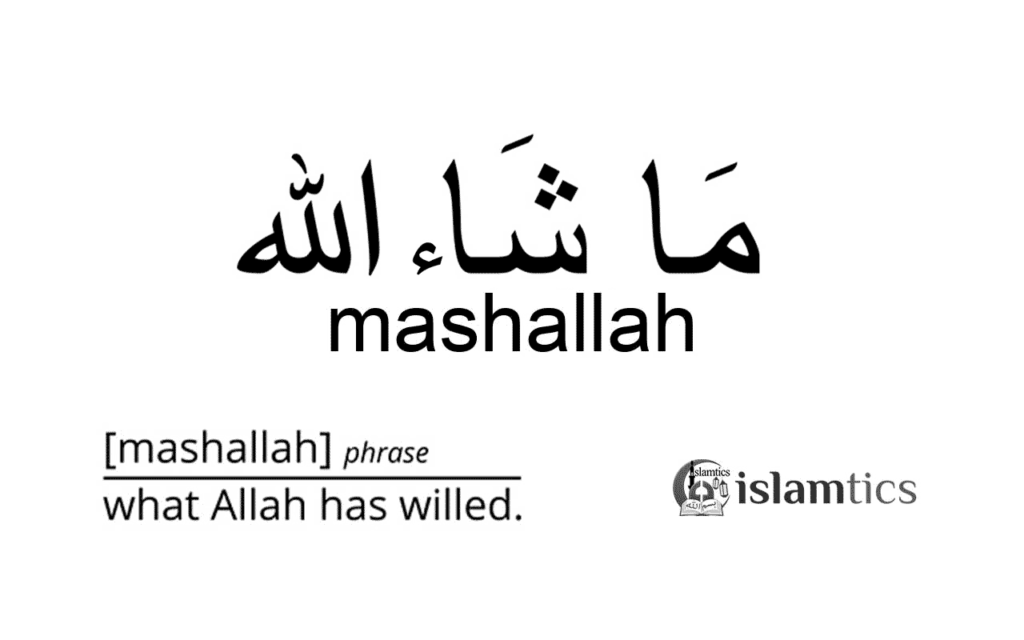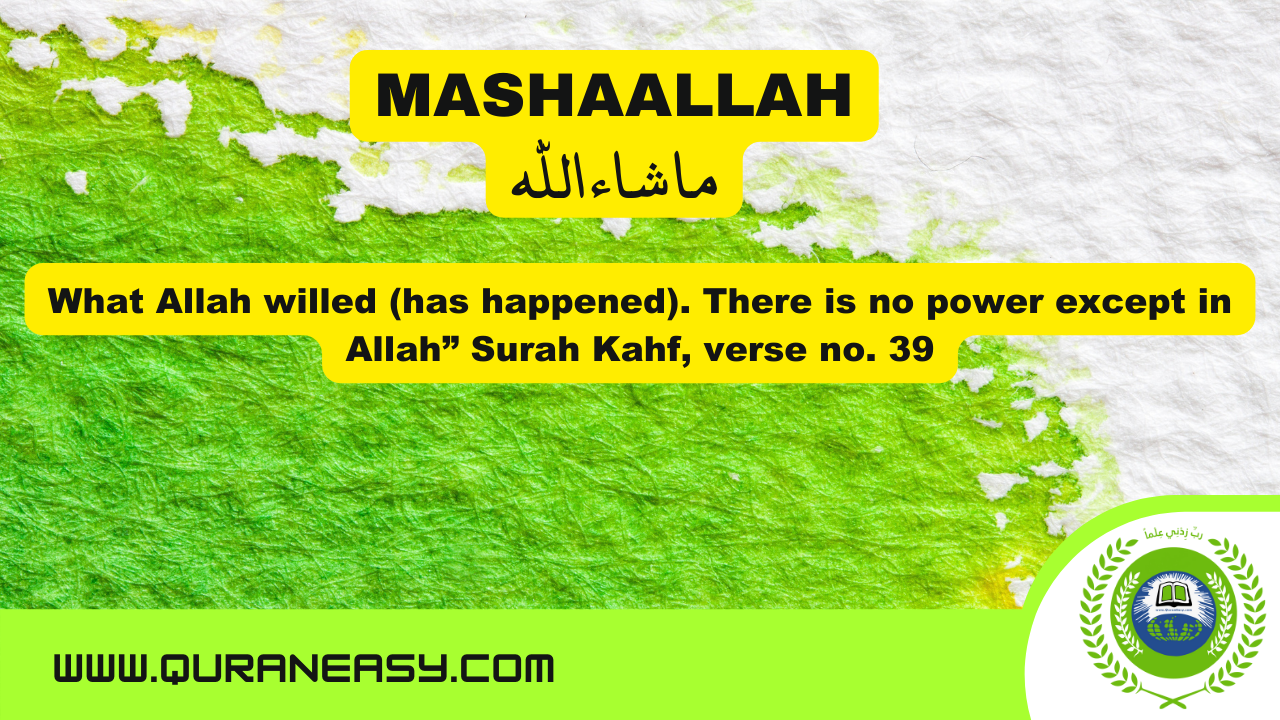Mashallah Meaning: Understanding Its Significance In Islamic Culture
Mashallah meaning is a phrase that holds profound significance in Islamic culture, representing admiration and appreciation for something beautiful or remarkable. This expression is often used to acknowledge the beauty of God's creation, whether it be a person, an event, or even a moment in time. The use of "mashallah" is deeply ingrained in the daily lives of Muslims, serving as a reminder of the presence of divine grace in their lives.
In this article, we will explore the meaning of mashallah, its origins, cultural implications, and how it is commonly used in various contexts. By understanding this phrase, we can appreciate the beauty and depth of Islamic expressions of gratitude and admiration.
As we delve deeper into the topic, we will also highlight the importance of using "mashallah" appropriately and respectfully, ensuring that we honor its significance in conversations and interactions. Join us on this enlightening journey to discover the richness of mashallah meaning and its role in fostering a positive outlook in our lives.
- Blue Face Mom The Journey Of A Viral Sensation
- Exploring Wisconsin Hockey A Comprehensive Guide To The Sports Legacy And Culture
Table of Contents
- What is Mashallah?
- Origin of Mashallah
- Cultural Significance of Mashallah
- How to Use Mashallah
- Mashallah in Daily Life
- Mashallah and Gratitude
- Mashallah in Art and Literature
- Conclusion
What is Mashallah?
Mashallah is an Arabic phrase that translates to "what Allah has willed" or "as Allah has willed." It is often used to express appreciation for something that is perceived as extraordinary, beautiful, or admirable. The phrase reflects a sense of humility and recognition of God's role in creating and shaping the world around us.
In many cultures, particularly within the Islamic community, mashallah is used in various contexts, such as:
- Complimenting someone's achievements or talents.
- Admiring the beauty of a child or a new endeavor.
- Expressing gratitude for blessings received.
Origin of Mashallah
The origin of the phrase mashallah can be traced back to the Arabic language, with "ma" meaning "what" and "sha" meaning "has willed." The term is deeply rooted in Islamic teachings, derived from the Quranic context, where it emphasizes the belief in God's omnipotence and the importance of attributing any good fortune to His will.
- Ronnie Foden Rising Star In The World Of Football
- What Is The Difference Between Baking Soda And Baking Powder
Historically, the use of mashallah can be linked to the Islamic tradition of avoiding the evil eye or jealousy. By uttering this phrase, individuals acknowledge that any blessings or beauty they encounter are a result of God's will, thereby redirecting any potential negative energy away from the person or thing being admired.
Cultural Significance of Mashallah
Mashallah holds significant cultural importance in many Muslim communities. It serves as a means of fostering a sense of community and connection among individuals. The phrase not only acknowledges the beauty and goodness in life but also encourages expressions of gratitude.
Some key cultural aspects of mashallah include:
- Building a positive atmosphere: Using mashallah helps create an environment where appreciation and admiration are celebrated.
- Encouraging humility: The phrase serves as a reminder that all good things come from Allah, promoting a sense of humility among individuals.
- Strengthening social bonds: Sharing compliments and expressions of admiration fosters deeper connections within communities.
How to Use Mashallah
Using mashallah correctly is essential to convey its intended meaning. Here are some guidelines on how to incorporate this phrase into your conversations:
- Use it genuinely: Only say mashallah when you truly feel admiration for something or someone.
- Apply it appropriately: Context matters; use mashallah when commenting on achievements, beauty, or blessings.
- Avoid overuse: While it is a lovely expression, refrain from using it excessively to maintain its significance.
Mashallah in Daily Life
Mashallah is commonly used in everyday conversations among Muslims. Whether it's praising a friend's new home, congratulating someone on a new job, or admiring a child's growth, the phrase is a versatile expression that enhances social interactions.
Examples of using mashallah in daily life include:
- When seeing a beautiful baby: "Mashallah, you have a lovely child!"
- Complimenting a friend's achievements: "Mashallah, you graduated with honors!"
- Praising nature: "Mashallah, this garden is stunning!"
Mashallah and Gratitude
The expression of mashallah is closely tied to gratitude. When individuals use the phrase, they are not only recognizing beauty but also expressing appreciation for the blessings in their lives. This connection to gratitude plays a vital role in Islamic teachings, emphasizing the importance of being thankful for the gifts one receives.
Practicing gratitude through the use of mashallah can lead to:
- A more positive outlook on life.
- Increased mindfulness of one's surroundings and experiences.
- Stronger relationships built on appreciation and respect.
Mashallah in Art and Literature
Mashallah has also found its way into various forms of art and literature, reflecting its cultural significance. Artists and writers often incorporate the phrase to convey themes of beauty, admiration, and divine grace.
In literature, mashallah is used to express admiration for characters or events, while in visual arts, it may be featured in calligraphy or incorporated into the design of artwork to emphasize beauty.
Conclusion
In summary, mashallah meaning is a powerful expression of admiration and gratitude within Islamic culture. Its origins and cultural significance reflect a deep appreciation for the beauty in life and a recognition of God's role in creating it. By incorporating mashallah into our conversations, we can foster a sense of community, humility, and gratitude.
We encourage readers to embrace the use of mashallah in their daily lives and to share their experiences with others. Whether it's leaving a comment below, sharing this article with friends, or exploring more about Islamic expressions of gratitude, every interaction helps spread positivity and appreciation.
Thank You for Reading!
We hope you found this article informative and engaging. We invite you to return to our site for more insights and discussions on cultural expressions and their meanings. Your journey of exploration into the richness of language and culture is just beginning!



Detail Author:
- Name : Melisa Jones
- Username : bogan.kayden
- Email : raynor.johathan@yahoo.com
- Birthdate : 1983-11-25
- Address : 679 Delia Trafficway Gaylordfort, OK 30908-4517
- Phone : 534-950-9793
- Company : Murphy-Rau
- Job : Calibration Technician OR Instrumentation Technician
- Bio : Qui debitis repellat molestias vel dolorem. Quisquam sint consequuntur autem consequuntur voluptatem velit ipsam ex. Ratione inventore et perferendis corporis unde libero enim a.
Socials
tiktok:
- url : https://tiktok.com/@alisa6406
- username : alisa6406
- bio : Vitae soluta eum eum quos qui doloribus dolorem.
- followers : 390
- following : 1095
twitter:
- url : https://twitter.com/alisa.dicki
- username : alisa.dicki
- bio : Dolore repellat aperiam ut temporibus. Ea dolorum adipisci minus iusto.
- followers : 2900
- following : 1840